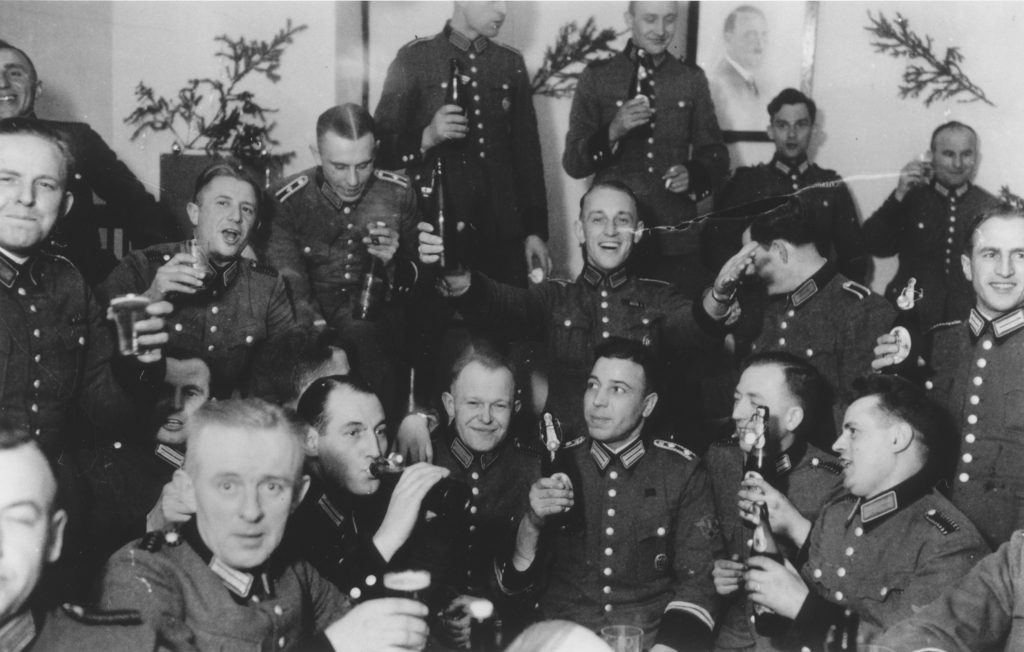Module 2: Gender and Sexuality
Jewish Men & Ordinary Men
Left Photo: Religious Jew in Hrubieszow forcibly having his beard shaven, Lublin, Poland, 1939-41, unknown photographer, Photograph Number: 06213, United States Holocaust Memorial Museum, courtesy of Raphael Aronson. Middle Photo: A Jewish man is forced to cut the beard of another Jewish man while Polish peasants watch, Lodz, Poland, 1939-40, unknown photographer, Photograph Number: 09019, United States Holocaust Memorial Museum, courtesy of Frank Morgens (Mieczyslaw Morgenstern). Right Photo: German policeman shaves the beard of a Jewish man in Zawiercie ghetto, Poland, 1940-43, unknown photographer, Photograph Number: 48593, United States Holocaust Memorial Museum, courtesy of Benjamin (Miedzyrzecki) Meed.
In these photos, Jewish men are targeted for humiliation by other men by having their beards forcibly shaved. Jewish men traditionally wore beards for religious and cultural reasons and forcibly shaving their beards is an assault on their masculinity as well as their religious and cultural identity and practices. As you move through this material, think about how masculinity and maleness operate similarly and differently for Jewish victims versus non-Jewish perpetrators and bystanders.
A note about gender and men: Often when we speak about gender, we tend to focus on women’s experiences because historical accounts too often exclude women from their narratives. While male experiences are often thought of as normative, we need to be attentive to how male gender functions in these histories as well. Expectations about maleness and masculinity, as well as male gender norms, shaped men’s experiences and behaviours in powerful ways.
Oral History: Tom Deri
Born in 1936, Tom Deri, a Jewish Holocaust survivor, was a small child during the war. He and several of his extended family survived the war when they went into hiding in Budapest. As a working-age man, Tom’s father was conscripted into forced labour before the family realized the need to go into hiding. The women, children, and elderly men who were too old to be conscripted would survive the war in hiding and elsewhere. Tom Deri describes how after the war, there was a missing generation of men who never returned. In this clip, Tom Deri speaks about his father’s experiences during the war. He describes how Jewish men were conscripted as laborers and speaks about how his father survived the copper mines by working as a servant for the German officers who ran the camp.
Oral History: Tom Deri
In this second clip, Tom Deri explains the ways in which his family survived in hiding.
Interactive Map
To learn more about Tom Deri’s life, press on the menu button on the top left of the interactive map below. You will then be able to scroll down and click on the different icons.
Oral History: Solomon Perel
In this oral history interview from France, survivor Solomon Perel describes how Jewish men and boys were always at risk of discovery if they were commanded to expose themselves and prove they were not circumcised and therefore not Jewish. In addition to this key example, what other gendered dimensions do you hear in his story?
Watch Solomon Perel (France 2)
Ordinary Men

Learn more about Police Battalion 101 in this chapter from Ordinary Men. Christopher Browning writes of the Józefów massacre where Jewish women, children and those who were frail and weak were taken into the forest and executed by men from Reserve Police Battalion 101.
Reflection Questions:
- Tom Deri learned about his father’s experiences during the war from his father and also from the commander who allowed his father to escape. Why do you think that Tom’s father didn’t share the story of the eggs with his son?
- Each of the sources in this section focus on men and their gendered behaviours and experiences. What common gendered elements or dimensions do you see in both the stories from survivors and in Browning’s description of the perpetrators?
- The men in this section are all “ordinary men.” How does thinking about male perpetrators and male victims as ordinary challenge your own understanding of the Holocaust?

